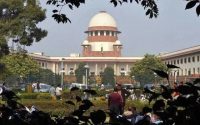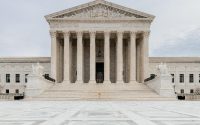$100 Website Offer
Get your personal website + domain for just $100.
Limited Time Offer!
Claim Your Website NowSupreme Court to hear review pleas on Ayodhya judgment today.
Source – hindustantimes.com
The review petitions challenging the November 9 judgment of the Supreme Court in the Ayodhya title dispute will be heard in-chamber by a five-judge bench of the apex court at 1.40pm on Thursday.
The bench will be headed by current Chief Justice of India (CJI) SA Bobde with justices DY Chandrachud, Ashok Bhushan and S Abdul Nazeer and Sanjiv Khanna as the other members.
Justice Sanjiv Khanna, who is the new member on the bench has taken the place of former CJI Ranjan Gogoi, who headed the bench which delivered the November 9 verdict. CJI Gogoi retired from office on November 17.
There are 18 review petitions filed by various parties.
The power of the Supreme Court to review its judgments originates from Article 137 of the Constitution. According to the law evolved by the court through various judgments, a review should be allowed only if there is an error apparent on the face of record in the judgment under review, or a new and important evidence has come to light which the person seeking review could not have produced at the time when the order under review was passed.
The court very rarely overturns its judgments in review petitions since the grounds for allowing a review petition are limited. A recent instance when the Supreme Court had taken a favourable view in a review petition was in the Sabarimala case when it held that the entry of women into the hill shrine in Kerala should be reconsidered after similar issues pending before the court in relation to Muslim and Parsi women are decided.
The five-judge bench headed by then-CJI Gogoi unanimously awarded title to the 2.77-acre disputed land in Ayodhya to Ram Lalla Virajman, the child deity, while granting five acres of land to Muslims at an alternative site for the construction of a new mosque.
The court also ordered the central government to set up a trust to oversee the construction of the temple, and to manage the disputed site.
The court, however, acknowledged the existence of a valid mosque at the disputed site and expressly stated that the acts of Hindus in placing idols inside the mosque in 1949 and destruction of the mosque in 1992 were illegal.
Jamiat-Ulama-i-Hind was the first party to challenge the verdict of the court claiming that complete justice can be done in the case only by ordering the Centre and the Uttar Pradesh government to rebuild the Babri Masjid at the disputed site.
It submitted that the judgment of the Supreme Court directing construction of a temple at the disputed site is virtually a direction to demolish the Babri Masjid because had the masjid not been illegally demolished on December 6, 1992, the implementation of the order of November 9 would have required the destruction of an existing mosque to make space for a proposed temple.
A similar stance was adopted by other review petitioners from the Muslim side. At least seven review petitions were filed with backing of the All India Muslim Personal Law Board (AIMPLB) claiming that the judgment of the court sanctioned serious illegalities.
“An idol as deity cannot be simultaneously illegally placed and legally valid to claim the title,” the petitions filed with the support of AIMPLB contended.
They submitted that the title could not have been awarded to Hindu parties based on exclusive possession of the site since it had been admitted that Muslims entered and prayed at the site till 1949.
The Akhil Bharat Hindu Mahasabha also filed a review petition challenging the finding the court that the disputed structure was a mosque. Mahasabha prayed that references in the judgment to “mosque/ Babri Masjid” should be changed to “disputed structure”.
It also said that the court could not have awarded five acres of alternative land to Muslims since no such prayer was made by the Muslim parties, and the court could not have gone beyond the prayers made to give such a direction.
Since the review petitions will be heard in-chambers, the hearing will not be open to public, and parties will not get an opportunity to make oral arguments. The court can, however, pass an order directing an open-court hearing, in which event the petitions will be listed for hearing later and petitioners will have the occasion to make oral arguments.
Related Posts

‘This Is Not How We Can Survive’: Supreme Court Slams Authorities Over Delhi Air Pollution.

Supreme Court Suggests Amending Constitution Over Powers Of Speaker To Disqualify MPs, MLAs.

